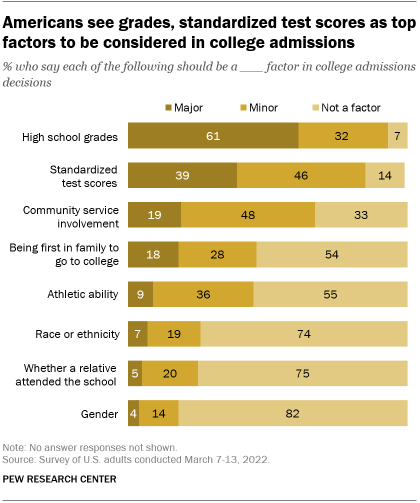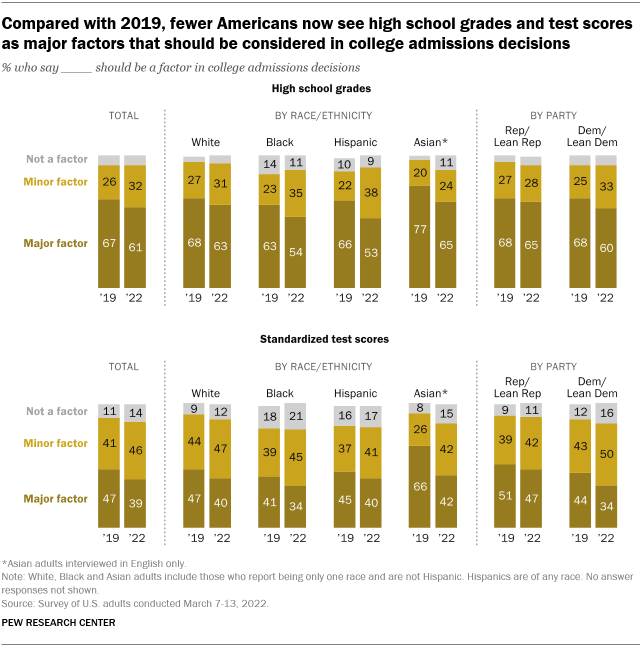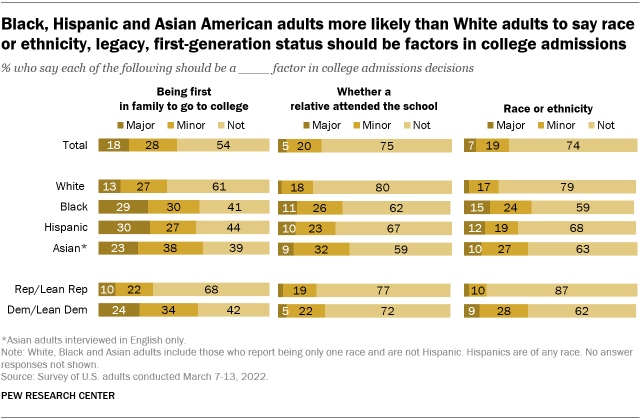With the college admissions process under increasing scrutiny – by colleges themselves and the U.S. Supreme Court – more Americans say high school grades and standardized test scores should matter in the admissions process than say the same about other factors.

More than nine-in-ten Americans (93%) say high school grades should be at least a minor factor in admissions decisions, including 61% who say they should be a major factor. Grades are, by far, the criteria the public says should most factor into admissions decisions. This is followed by standardized test scores (39% major factor, 46% minor factor) and community-service involvement (19% major, 48% minor), according to a Pew Research Center survey conducted March 7-13, 2022.
Nearly half of Americans (46%) say someone being the first in their family to go to college should be either a major (18%) or minor (28%) factor in admissions decisions, while a similar share says athletic ability should factor into these decisions (9% major, 36% minor).
By comparison, nearly three-quarters of Americans or more say gender, race or ethnicity, or whether a relative attended the school should not factor into admissions decisions.
The relative importance of each of these factors is unchanged since 2019. However, there have been declines in the shares of U.S. adults who say grades and standardized tests should be major factors. Around six-in-ten adults (61%) now say high school grades should be a major factor, down from 67% in 2019. And 39% of adults currently say standardized test scores should be a major factor, down from 47% three years ago.

Over this same time period, there has been an increase in the share of adults who say that whether someone’s relative attended a particular school – sometimes referred to as “legacy admissions” – should not be a factor in admissions decisions. Today, 75% say this, up from 68% in 2019. There has been little change in the public’s views of the other factors asked about in the survey.
Large majorities across racial and ethnic groups and partisan lines continue to say high school grades should be a factor in college admissions decisions, but there have been some shifts since 2019 in the shares saying it should be a major factor. Asian American (65%) and White adults (63%) are now somewhat more likely than Black (54%) and Hispanic (53%) adults to say high school grades should be a major factor. Three years ago, Asian American adults (77%) were more likely than White (68%), Hispanic (66%), and Black (63%) adults to say this.
At the same time, the share of Democrats and Democratic-leaning independents who say high school grades should be a major factor has decreased from 68% in 2019 to 60% today. There has been less change among Republicans and GOP leaners, from 68% in 2019 to 65% today.
In both parties, fewer now say standardized test scores should be a major factor in college admissions decisions than said the same three years ago. But this shift is starker among Democrats (34% now, down from 44%) than Republicans (47% now, down from 51%). And while there have been declines across racial and ethnic groups in the shares who say standardized test scores should be a major factor in college admissions, this decline is particularly pronounced among Asian Americans. (Three in ten Asian Americans live in California, a higher share than among other racial and ethnic groups. Public universities in that state have dropped standardized testing requirements in recent years.)
Race and ethnicity, first-generation status, legacy admissions
Although majorities of Americans across racial and ethnic and partisan groups say race or ethnicity should not be factored into college acceptance decisions, there are variations in how widely this view is held.
About eight-in-ten White adults (79%) say race or ethnicity should not factor into admission decisions. By comparison, 68% of Hispanic adults say this, as do about six-in-ten Asian American (63%) and Black (59%) adults. And while 87% of Republicans say race or ethnicity should not be a factor in admissions, that share falls to 62% among Democrats.
While three-quarters of Americans say having a relative who attended the school should not factor into decisions, White adults (80%) are more likely than Hispanic (67%), Black (62%), and Asian American (59%) adults to say this.

The public is divided about whether being the first in the family to go to college should be a factor in college admissions decisions (46%) or not (54%). About six in ten Democrats (58%) say first-generation status should be a consideration in admissions; about a third of Republicans (32%) take this position. Asian American, Black, and Hispanic adults are more likely than White adults to say first-generation status should be a factor in admissions.

